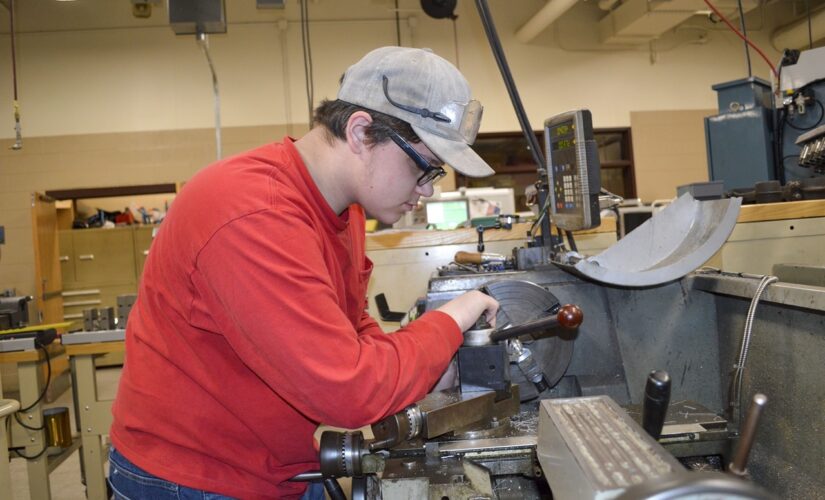Precision Machine Technology
(48 .0501)
Program Description
PMT_Essential skills chart_2022
This is an instructional program that prepares individuals to apply technical knowledge and skills in all aspects of shaping metal parts. Instruction involves making computations relating to work dimensions, tooling and feeds and speeds of machining. Emphasis is placed upon bench work and the operation of lathes, power saws, shapers, milling machines, grinders, drills and computer operated equipment (CNC and CIM). Instruction also includes the use of precision measuring instruments such as layout tools, micrometers and gauges; methods of machining and heat treatment of various metals; blueprint reading; and the layout of machine parts. Instruction prepares students to operate all types of hand and computer controlled machines. Machinists use machine tools, such as lathes, milling machines, and machining centers, to produce precision metal parts. Although they may produce large quantities of one part, precision machinists often produce small batches or unique items. They use their knowledge of the working properties of metals and their skill with machine tools to plan and carry out the operations needed to make machined products that meet precise specifications. Some machinists, often called production machinists, may produce large quantities of one part, especially parts requiring the use of complex operations and great precision. Frequently, machinists work with computer control programmers to determine the manner in which the automated equipment will cut. Because the technology of machining is changing rapidly, machinists must learn to operate a wide range of machines. Some newer machines use lasers, water jets, or electrified wires to cut the product. While some of the computer controls are similar to other machine tools, machinists must understand the unique cutting properties of these different machines. As engineers create new types of machine tools and new materials to machine, machinists must constantly learn new machining properties and techniques. Many machinists work a 40 hour week. Evening and weekend shifts are becoming more common as companies extend hours of operation to make better use of expensive machines. In high school, students should take math courses, especially trigonometry, and, if available, courses in blueprint reading, metalworking, and drafting. Formal apprenticeship programs, typically sponsored by a union or manufacturer, are an excellent way to learn the job of machinist. Apprentices usually must have a high school diploma, GED, or the equivalent, and most have taken algebra and trigonometry classes. Apprenticeship programs consist of paid shop training and related classroom instruction. In shop training, apprentices may work full time and are supervised by an experienced machinist while learning to operate various machine tools. Classroom instruction includes math, physics, materials science, blueprint reading, mechanical drawing, and quality and safety practices. Apprenticeship classes are often taught in cooperation with local community colleges or vocational technical schools. Many entrants previously have worked as machine setters, operators, or tenders. To boost the skill level of machinists and to create a more uniform standard of competency, a number of training facilities, state apprenticeship boards, and colleges are implementing curricula that incorporate national skills standards developed by the National Institute of Metalworking Skills (NIMS). After completing such a curriculum and passing practical and written exams, trainees are granted a certificate, recognized as a NIMS credential. Completing a recognized certification program provides a machinist with better career opportunities and helps employers to better judge the abilities of new hires. Journeyman certification can be obtained from state apprenticeship boards after completing an apprenticeship.
